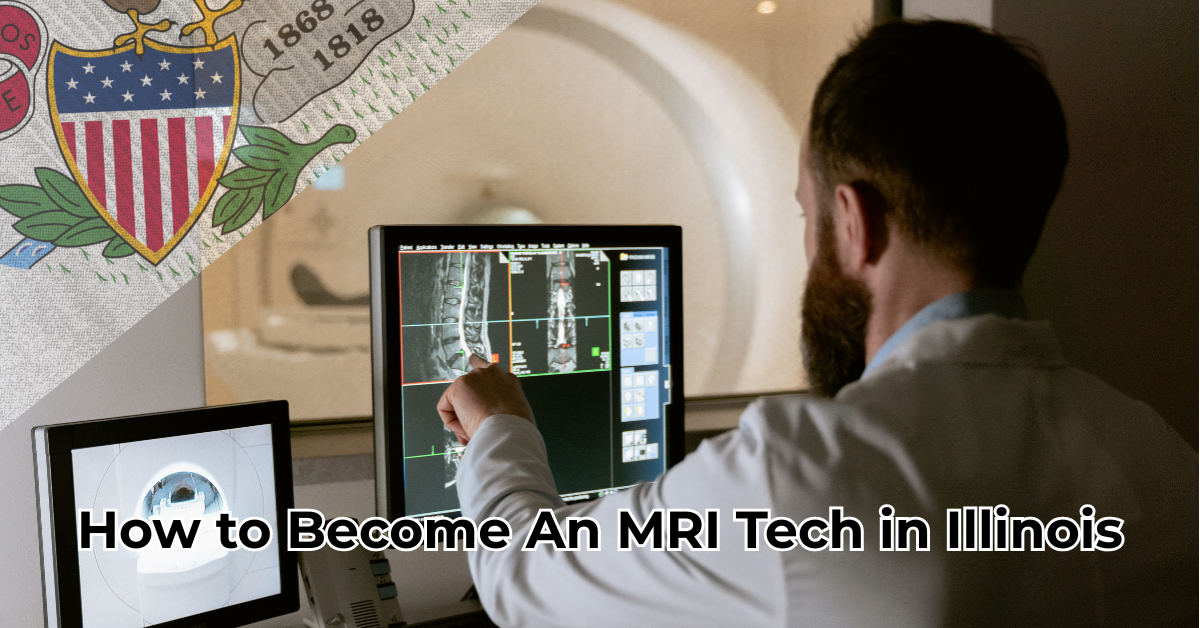Magnetic Resonance Imaging (MRI) technologists are health professionals who work in state-of-the-art MRI scan devices to provide detailed images of the internal body.
MRI techs are an important part of the medical process of diagnosing such diseases as sports injuries, as well as such complex neurological conditions as epilepsy.
The need for MRI technologists has been on the increase as Illinois boasts of the best medical centers, such as Northwestern Memorial Hospital, University of Chicago Medicine, and Advocate Health.
The U.S. Bureau of Labor Statistics (BLS) notes that MRI technologist employment will increase at a rate of 6 percent in the country during 2022-2032, which is higher than that of most jobs.
The situation is particularly bright in the state of Illinois, where the concentration of healthcare facilities is high in such cities as Chicago, Springfield, and Peoria.
By 2025, MRI technologists in Illinois are poised to enjoy good job security as well as good remuneration, implying that it is a lucrative career option for such healthcare professionals who do not have the ten-year obligation of medical school.
Step 1 — Education Requirements: Best MRI Tech Programs & Schools in Illinois
The initial process that one must undergo to become an MRI technologist is to obtain the necessary education in Illinois. An MRI tech cannot be made of a high school graduate, like in some other healthcare professions. Rather, the majority of employers demand at least an associate degree in radiologic technology or in MRI technology and then special training in the area of MRI.
Minimum Education Requirement
- High School Diploma or GED – Foundation for college admission.
- Associate Degree (2 years) – Most MRI techs in Illinois start with an associate degree in Radiologic Technology, often accredited by the Joint Review Committee on Education in Radiologic Technology (JRCERT).
- Bachelor’s Degree (4 years) – Optional, but can improve job prospects in larger hospitals and research facilities.
MRI Tech Programs in Illinois (2025)
Several Illinois institutions offer MRI-focused programs and radiologic technology degrees with pathways to MRI specialization. As of 2025, some of the most recognized options include:
- College of DuPage (Glen Ellyn, IL) – Offers an Associate in Applied Science in Radiography with MRI specialization.
- City Colleges of Chicago – Malcolm X College – Known for its strong healthcare programs, including radiologic technology leading to MRI training.
- Illinois State University (Normal, IL) – Offers a bachelor’s program in Medical Radiologic Sciences with advanced imaging options.
- Southern Illinois University (Carbondale, IL) – Provides a bachelor’s program in Radiologic Sciences with MRI pathways.
- Rush University (Chicago, IL) – Offers advanced post-graduate certificates and bachelor’s completion options for imaging professionals.
Duration of Study
- Associate programs typically take 24 months.
- Bachelor’s programs take 4 years.
- MRI certificate programs (for already licensed radiologic techs) can be completed in 12–18 months.
Pursuing a program accredited by JRCERT or recognized by the American Registry of Radiologic Technologists (ARRT) is essential, as this ensures eligibility for certification exams.
Step 2 — Clinical Training & Clinical Hours: What Illinois Employers Expect
Education alone isn’t enough to become an MRI technologist. Illinois healthcare facilities, especially large hospitals in Chicago, place a strong emphasis on hands-on clinical training. Clinical hours allow students to work directly with MRI scanners, patients, and experienced technologists, building the confidence needed for a full-time role.
What Clinical Training Includes
- Patient Interaction – Learning how to position patients, explain procedures, and ensure comfort.
- MRI Safety – Understanding magnetic field safety protocols, including screening for implants or devices.
- Technical Skills – Operating MRI scanners, adjusting settings, and troubleshooting image quality.
- Teamwork – Working alongside radiologists, nurses, and other technologists in real hospital environments.

Clinical Hour Requirements in Illinois (2025)
Most programs accredited by JRCERT or recognized by the ARRT require students to complete between 1,000–1,500 clinical hours before graduation. This usually happens through partnerships with hospitals and imaging centers across Illinois.
Popular clinical placement sites for students include:
- Northwestern Memorial Hospital (Chicago)
- Advocate Christ Medical Center (Oak Lawn)
- OSF Saint Francis Medical Center (Peoria)
- Memorial Medical Center (Springfield)
Employers in Illinois generally prefer candidates with extensive supervised experience, as it reduces on-the-job training time.
Step 3 — Certification & Licensing: ARRT, MRI Credentials, and Illinois Rules
After completing education and clinical training, the next step is earning professional certification. In Illinois, MRI technologists are not required to hold a state license, but national certification is a must for nearly all employers.
ARRT Certification (Standard Pathway)
The American Registry of Radiologic Technologists (ARRT) is the most recognized certifying body. To qualify for the ARRT MRI Certification, you must:
- Graduate from an ARRT-approved educational program.
- Complete the required clinical competencies.
- Pass the ARRT certification exam.
The ARRT exam covers patient care, safety, image production, and MRI procedures. Passing scores are required to be officially recognized as a certified MRI technologist.
Post-Primary Pathway
Although you are already a certified Radiologic Technologist (RT), Nuclear Medicine Technologist (NMT), or Radiation Therapist, you can also obtain MRI certification through the post-primary pathway, which also requires taking more courses and clinical competencies specific to MRI.
Continuing Education in Illinois.
After certification, MRI techs have to acquire 24 continuing education credits every 2 years to remain ARRT. The CE courses can be found at many Illinois universities and medical centers, and in many cases, can be offered online or through workshops.
Why Certification Matters in Illinois
- Most Illinois hospitals will only hire ARRT-certified MRI techs.
- Certification improves salary potential by 10–15% compared to uncertified candidates.
- It allows mobility across states if you choose to relocate.
Step 4 — Salary, Job Market, and Top Cities Hiring MRI Techs in Illinois (2025 Data)
MRI technologists in Illinois enjoy competitive salaries and a strong job market due to the state’s extensive healthcare system. With major hospitals, research centers, and private imaging clinics spread across urban and suburban areas, demand remains high.
Average Salary in Illinois (2025)
According to the U.S. Bureau of Labor Statistics (BLS, updated 2025), the average salary for MRI technologists in Illinois is approximately $87,500 per year or about $42 per hour. This is slightly higher than the national median of $84,000 annually.

Salary by Experience
- Entry-level (0–2 years): $65,000–$72,000
- Mid-career (3–7 years): $80,000–$90,000
- Senior-level (8+ years): $95,000–$110,000
Best Cities for MRI Tech Jobs in Illinois
- Chicago – The Highest number of job opportunities with major hospitals like Northwestern Memorial, Rush University Medical Center, and University of Chicago Medicine.
- Aurora & Naperville – Growing suburban healthcare networks with attractive salary packages.
- Springfield – State capital with several large medical centers.
- Peoria – Home to OSF Saint Francis Medical Center, a leading employer of imaging professionals.
- Rockford – Regional hospitals and imaging centers offer stable employment opportunities.
Job Outlook 2025–2030
- Projected growth: 6% (steady with national rate)
- Annual openings in Illinois: About 350–400 new positions per year due to retirements and increased demand.
- Specialty advantage: MRI techs with skills in cardiac MRI and functional brain imaging are especially sought after in Illinois research hospitals.
Step 5 — How to Apply, Advance, and Keep Your MRI Certification
Becoming an MRI technologist is just the beginning. In Illinois, opportunities to advance and specialize are plentiful, especially if you stay committed to professional development.
Application Tips for New MRI Techs
- Resume: Highlight clinical hours, ARRT certification, and patient care experience.
- Networking: Join professional groups like the Illinois State Society of Radiologic Technologists (ISSRT).
- Job Boards: Check healthcare networks such as Advocate Health, Northwestern Medicine, and Ascension Illinois.
Advancing Your Career
- Specialize – Focus on advanced imaging fields like cardiac MRI, pediatric MRI, or neuroimaging.
- Leadership Roles – With experience, MRI techs can move into supervisory or management positions.
- Education Pathways – Earning a bachelor’s or master’s degree in medical imaging can open doors to teaching or administrative roles.
Maintaining ARRT Certification
- Complete 24 continuing education (CE) credits every 2 years.
- Renew certification by paying ARRT annual fees and submitting CE documentation.
- Stay updated on new MRI safety protocols and technology advancements through professional seminars.
Long-Term Career Benefits
Certified MRI technologists in Illinois who continue learning and pursuing specialties often see salary increases of 15–20% compared to those who only maintain minimum credentials.
Step 6 — Final Thoughts: Is Becoming an MRI Tech in Illinois Worth It?
Being an MRI technologist is a brilliant choice to pursue in Illinois as a career that offers a stable and fulfilling, and well-paying career in healthcare. MRI technology also provides a faster route to finding a profession in which your skills have a direct impact on patients’ lives daily.
Unlike other career paths, where the path may take 10 years of education and training, MRI technology provides a shorter route to a career requiring only 2-4 years of education and training.
Illinois is one of the best states to establish this profession. The opportunities are great in Chicago with world-class hospitals and professional bodies such as the Illinois State Society of Radiologic Technologists to support, and professional bodies willing to support professional growth, and their need for skilled imaging people is high.
Through the completion of the appropriate education, clinical hours, certification and continuing education, you will not only achieve the expectations of the employers but also set yourself up to succeed in the long run.
Key Takeaways
- Timeframe to become an MRI Tech in Illinois (2025): About 2–4 years, depending on Degree and pathway.
- Certification: ARRT certification is essential for employment.
- Salary Outlook: Average pay of $87,500 per year, with higher earning potential in major cities like Chicago and Naperville.
- Job Market: Steady growth with 350–400 annual openings across Illinois.
- Advancement: Specializations and leadership roles can increase salary by 15–20%.
Why This Career Path Matters
Becoming an MRI technologist isn’t just about operating machines — it’s about helping doctors uncover what the eye can’t see, from brain tumors to spinal injuries. In Illinois, with its strong healthcare infrastructure, MRI techs play a vital role in improving patient outcomes and advancing medical research.
If you’re someone who values a balance of technology, patient care, and career growth, pursuing an MRI tech career in Illinois may be one of the best decisions you’ll ever make.
FAQs
How long does it take to become an MRI tech in Illinois?
It usually takes 2 to 4 years, depending on whether you pursue an associate’s or a bachelor’s Degree. Certificate programs for already licensed radiologic technologists take 12–18 months.
How much does an MRI tech make in Illinois?
As of 2025, MRI technologists in Illinois earn an average salary of $87,500 per year, with experienced techs making over $100,000 annually in top hospitals.
What is the fastest way to become an MRI tech?
The fastest path is completing an MRI certificate program after becoming a licensed radiologic technologist. This route can take just 12–18 months.
How long does it take to train in MRI?
Training includes classroom education and 1,000–1,500 clinical hours, typically completed in 2 years through an accredited associate program.

